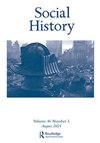Facilitating, controlling and excluding from movement: religious orders, organizational networks and mobility infrastructure in the early modern Mediterranean
IF 0.9
1区 历史学
Q1 HISTORY
引用次数: 0
Abstract
Through an analysis of the network associated with the Franciscan Custody of the Holy Land, this article challenges overly positive narratives of early modern mobility and of the role played by networks more generally. It reconstructs the functioning of the Franciscan network, focusing on its ‘immobile infrastructure’ and showing how the latter facilitated and at the same time controlled and limited friars’ movement. Building on this analysis, the article postulates the existence of an ‘organisational migration infrastructure’, which enabled, addressed and controlled people’s movement according to organisations’ interests. The article also suggests a new methodological approach to the study of early modern networks, centring its analysis on ‘organisational migrants’ and using the notion of ‘infrastructure’ as an analytical tool. From a wider perspective, the article deepens our general understanding of early modern mobility, particularly with regard to the role of networks and organisations, and to the entanglement of mobility, immobility, control and exclusion.促进、控制和排斥流动:近代地中海早期的宗教秩序、组织网络和流动基础设施
通过对圣地的方济会监护网络的分析,本文挑战了对早期现代流动性的过度积极的叙述,以及网络更普遍地发挥的作用。它重建了方济各会网络的功能,重点关注其“固定的基础设施”,并展示了后者如何促进,同时控制和限制修士的运动。在此分析的基础上,文章假设存在一个“组织迁移基础设施”,它根据组织的利益实现、解决和控制人们的流动。这篇文章还提出了一种研究早期现代网络的新方法,将其分析集中在“组织移民”上,并使用“基础设施”的概念作为分析工具。从更广泛的角度来看,这篇文章加深了我们对早期现代流动性的一般理解,特别是关于网络和组织的作用,以及流动性、不流动性、控制和排斥的纠缠。
本文章由计算机程序翻译,如有差异,请以英文原文为准。
求助全文
约1分钟内获得全文
求助全文
来源期刊

Social History
HISTORY-
CiteScore
1.10
自引率
0.00%
发文量
37
期刊介绍:
For more than thirty years, Social History has published scholarly work of consistently high quality, without restrictions of period or geography. Social History is now minded to develop further the scope of the journal in content and to seek further experiment in terms of format. The editorial object remains unchanged - to enable discussion, to provoke argument, and to create space for criticism and scholarship. In recent years the content of Social History has expanded to include a good deal more European and American work as well as, increasingly, work from and about Africa, South Asia and Latin America.
 求助内容:
求助内容: 应助结果提醒方式:
应助结果提醒方式:


